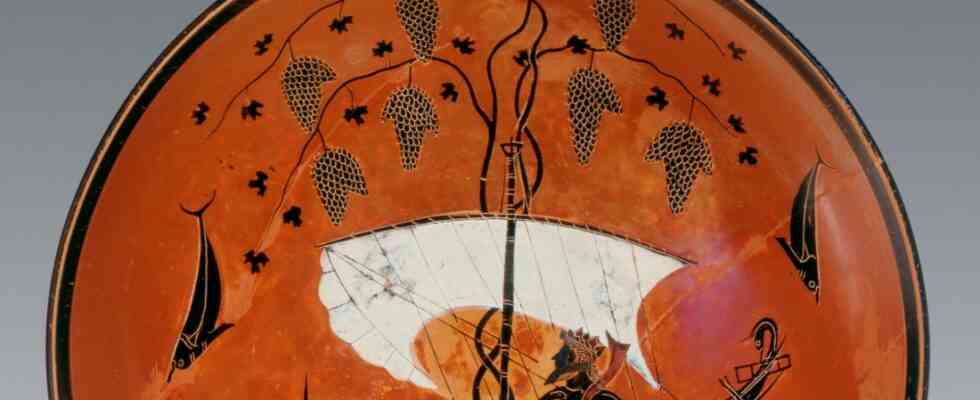Dionysus, the old reveler. God of wine and grapes, joy and fertility, intoxication, madness and ecstasy. Known and loved by many – although not by everyone from an educational perspective. But even those who think they know Dionysos well will be surprised at one point or another to find out which sources and references are mentioned here. With Dionysos, the State Collections of Antiquities and the Munich Glyptothek started their museum podcast “Listening to Antiquities” just before Christmas, as it were “divinely intoxicated”.
Four have since been published: about Dionysos, the art of love (“frivolous, liberal, poetic”), death in life (“metamorphosis, cult of the dead and ideas about the afterlife”) and “In vino veritas” about wine, truth and madness. In January and February it’s about “The Olympian gods – ideal and imperfect, immortal human” (Jan. 5), “Woman power – woman of the house and heroine of the fight” (Jan. 19), about the “portrait – faithful Image or skilful staging?” (February 2nd) and the “Ideal Form – Human Images, Body Cult and Naked Reality” (February 16th).
After that, the publications are planned on a monthly basis. The museum podcast can be accessed via a link on the homepage and via Spotify. They are literary, philosophical, art historical and archaeological excursions from antiquity to the present day, conceived and spoken by the reciter Barbara Greese and the curator Astrid Fendt.
“I sing of Dionysus,” says Homer. And with this source, the two also enter their dialogically designed podcast. The story tells of the birth (from the thigh of Zeus) and the growing up of the young god, who first has to secure his place in Olympus. He succeeds with his gift – the wine. Intoxication and liberation, madness and joy, destruction and inspiration – the faces and effects of the god who also appears as a human being are ambivalent and multifaceted. His special connection to the theater and to poets plays a major role.
The praises of Socrates, Ovid, Plutarch and Augustinus, Justus von Liebig and even Goethe, Mann and Borchert show how much the “happy” effect of wine has been sung about at all times. Hölderlin and Nietzsche in particular have shaped the modern reception of the ancient myth of the Dionysian, as Barbara Greese emphasizes. And Astrid Fendt explains in detail Exekias’ Dionysos bowl depicting a Greek warship. The clay drinking bowl, created around 530 BC. Christ is one of the showpieces in the Munich Antiquities Collection.
Because, of course, the new podcast is also about presenting the objects in the collection, explaining the techniques used in their production, the stories they tell and their art-historical meanings. So in the first episode you not only learn a lot about Dionysus, but also about the famous drinking bowl that was used in drinking bouts, the symposiums. Although this covered the face of the reveler, the two painted eyes looked directly at the revelers and let the drinker slip into the role of the god of wine.
Aphrodite, the foam born, with the fan shell. This clay statuette from the 3rd century B.C. Astrid Fendt is included in the new museum podcast “Antike Hören” of the State Collections of Antiquities and Glyptothek in Munich.
(Photo: State Collections of Antiquities and Glyptothek Munich, Renate Kühling)
The podcast on the art of love is also wonderfully clear. Here you can hear stories about the foam-born Aphrodite (or Venus, because reference is also made to the Roman counterparts), who is said to owe her birth to the emasculation of Uranus, descriptions of same-sex love in Plato and Sappho, instructions from Ovid’s world of ideas or also amorous eulogies penned by Heine, Ringelnatz and Tucholsky. Thanks to a depiction of a wedding on an amphora from around 510 BC, Fendt contributes scenes of a very wild marriage between Hera and Zeus.
The exposure of a deceased shows the painting on a c. 440 BC. B.C. Loutrophores in the collections of antiquities in Munich.
(Photo: State Collections of Antiquities and Glyptothek Munich, Renate Kühling)
Death also plays a role in the museum podcast “Antike Hören”. Because pleasure and frustration, lust and suffering, life and death are not always close together, as in the case of Orpheus and Eurydice, whose story leads down into the kingdom of Hades. And has one ever listened so happily to such a cruel death hunt as that of the cat and the mouse by Tucholsky? Using a selection of objects and texts from more than two and a half millennia, Barbara Greese and Astrid Fendt unfold a multi-layered panorama between Memento Mori and Carpe Diem.
Even if you sometimes wish that the authors would moderate or paraphrase the quotes more or that occasionally “less is more” would come into its own – you can look forward to further entertaining and instructive episodes.
Museum podcast “Antique Hören”, available via Spotify or the Antiquities Collections website.

